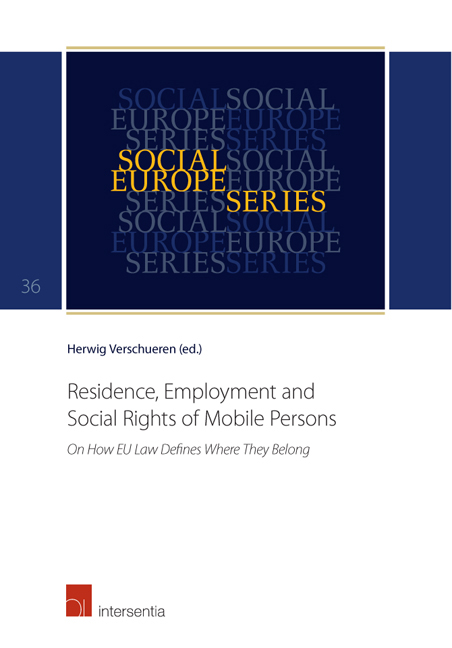Book contents
- Frontmatter
- Preface
- Contents
- List of Abbreviations
- List of Contributors
- Chapter 1 How EU Law Defines where Mobile Persons Belong. An Introduction
- Chapter 2 Family as Link. Explaining the Judicial Change of Direction on Residence Rights of Family Members from Third States
- Chapter 3 The Direction of the Court's Family Reunification Case-Law. A Plea for (Timely) Moderation
- Chapter 4 Sufficient Resources and Residence Rights under Directive 2004/38
- Chapter 5 Free Movement of Persons and European Solidarity. A Melancholic Eulogy
- Chapter 6 Once a Foreigner, Always a Foreigner. Who Does Not Belong Here Anymore? Expulsion Measures
- Chapter 7 Who Does Not Belong Here Anymore? A Statistical Snapshot of Member States’ Practices
- Chapter 8 Civic Integration Exams in EU Immigration Law. What Integration is Not in European Law
- Chapter 9 I Study Here, and Thus I Belong? Mobile Students in the European Union
- Chapter 10 Being Economically Active: How It Still Matters
- Chapter 11 Where Do EU Mobile Workers Belong, According to Rome I and the (E)PWD?
- Chapter 12 Conflicting Rules of Conflict: Social Security and Labour Law
- Chapter 13 Conflicting Rules of Conflict: Social Security and Labour Law. A Response
- Chapter 14 Where Does the UK Belong?
Chapter 13 - Conflicting Rules of Conflict: Social Security and Labour Law. A Response
Published online by Cambridge University Press: 22 September 2018
- Frontmatter
- Preface
- Contents
- List of Abbreviations
- List of Contributors
- Chapter 1 How EU Law Defines where Mobile Persons Belong. An Introduction
- Chapter 2 Family as Link. Explaining the Judicial Change of Direction on Residence Rights of Family Members from Third States
- Chapter 3 The Direction of the Court's Family Reunification Case-Law. A Plea for (Timely) Moderation
- Chapter 4 Sufficient Resources and Residence Rights under Directive 2004/38
- Chapter 5 Free Movement of Persons and European Solidarity. A Melancholic Eulogy
- Chapter 6 Once a Foreigner, Always a Foreigner. Who Does Not Belong Here Anymore? Expulsion Measures
- Chapter 7 Who Does Not Belong Here Anymore? A Statistical Snapshot of Member States’ Practices
- Chapter 8 Civic Integration Exams in EU Immigration Law. What Integration is Not in European Law
- Chapter 9 I Study Here, and Thus I Belong? Mobile Students in the European Union
- Chapter 10 Being Economically Active: How It Still Matters
- Chapter 11 Where Do EU Mobile Workers Belong, According to Rome I and the (E)PWD?
- Chapter 12 Conflicting Rules of Conflict: Social Security and Labour Law
- Chapter 13 Conflicting Rules of Conflict: Social Security and Labour Law. A Response
- Chapter 14 Where Does the UK Belong?
Summary
THE SCOPE OF CONFLICT-OF-LAW RULES
Prof. Cornelissen has presented a thorough analysis of the case-law of the CJEU in which it evolves the reach of what is laid down in Articles 11–16 of Regulation 883/2004. And he has shown the not easy relations between conflict-of-law rules in social security and those contained in Regulation Rome I. He has not left any significant lacuna which I could fill.
Therefore I shall concentrate my discussion paper on the recent and very contested case-law of the CJEU concerning the doctrinal dimension of Article 11 et seq. of Regulation 883/2004. I understand my short statement as a legal narrative of that small piece of legal history which the CJEU has written beginning with Bosmann and momentarily ending with Franzen. My reading and analysis of these judgments is somewhat different from what most authors have thought and written. I see the messages the Court wanted to send out less critically. And I believe that examples can be offered which show that the main idea behind Bosmann, strictly interpreted, is reasonable and need not endanger the application of provisions on conflict-of-laws. But I join the critics where in my opinion the Court had crossed the Rubicon which forms the boundaries needed for an unambiguous determination of the applicable law.
As Prof. Cornelissen has clearly documented, the CJEU in the beginning of its case-law on the provisions on conflicts of law followed a clear-cut approach insisting on the strict and mandatory character of the rules in question. The leading cases which established the scope and the reach of these provisions were Ten Holder and Luijten. The central message is that conflict-of-law rules ‘constitute a complete system of conflict rules the effect of which is to divest the legislature of each Member State of the power to determine the ambit and the conditions for the application of its national legislation so far as the persons who are subject thereto and the territory within which the provisions of national law take effect are concerned’. This is what we call the mandatory character of the rules contained in Article 11 et seq. which also encompasses the exclusivity rule according to which every person is subject to the legislation of a single Member State only.
- Type
- Chapter
- Information
- Residence, Employment and Social Rights of Mobile PersonsOn How EU Law Defines Where They Belong, pp. 285 - 300Publisher: IntersentiaPrint publication year: 2016



